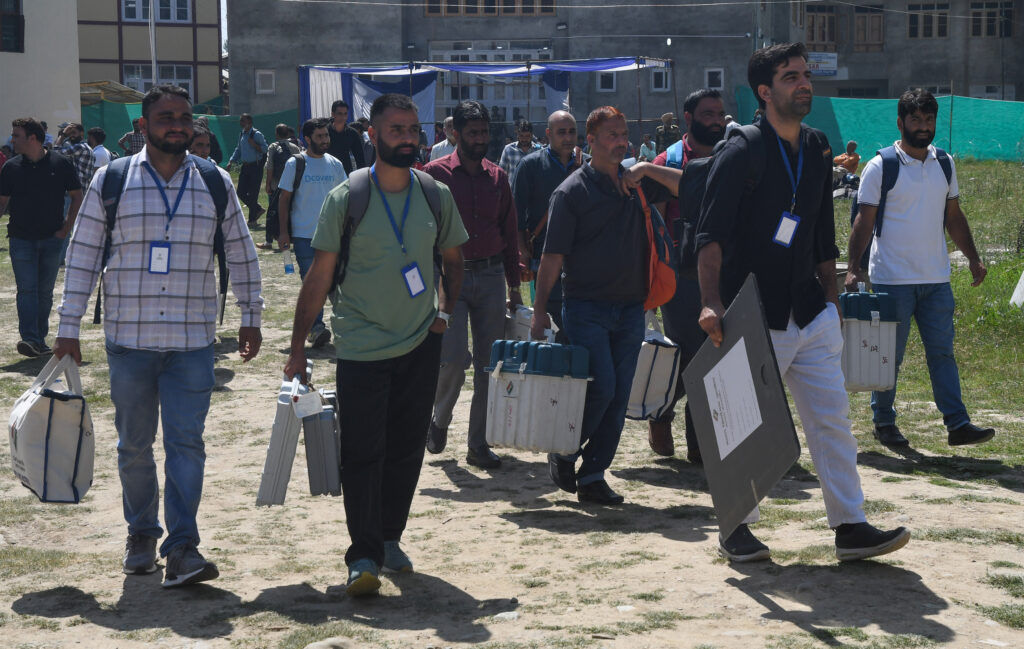Number Game of ‘Counting to 4’ May Redraw J&K’s Political Faultlines
By: Javid Amin | 12 October 2025
The political stage in Jammu and Kashmir is witnessing a strategic recalibration as four crucial assembly bypolls near. What was expected to be a multi-cornered contest has unexpectedly narrowed down to a direct clash between Jammu & Kashmir National Conference (NC) and Bharatiya Janata Party (BJP), after Indian National Congress withdrew and Democratic Progressive Azad Party (DPAP) decided not to contest.
This “number game of counting to four” is not merely about seats — it has become a litmus test for alliances, party strength, and shifting power equations in a post-Article 370 political landscape.
Congress: “Safe Seat or Nothing”
For Congress, the decision to withdraw from the race was both tactical and symbolic. Party sources confirm that senior leaders, including K. C. Venugopal, pushed for at least one guaranteed winnable seat as part of its seat-sharing understanding with NC.
When no such commitment came through, Congress walked away.
“We won’t contest just to lose. The alliance must be built on mutual respect and realistic prospects,” a senior Congress strategist said after internal consultations.
✦ Implications of the Congress Exit:
-
Weakens the INDIA bloc’s collective positioning in J&K
-
Gives BJP and NC a cleaner, direct battleground
-
Signals that Congress is prioritizing the 2026 general elections over short-term symbolic battles
-
Risks marginalization in UT politics if the party remains a spectator rather than a stakeholder
Political observers note that the Congress decision reflects growing unease within the INDIA bloc over seat-sharing negotiations, with Jammu and Kashmir emerging as a fault line.
DPAP: Tactical Silence, Calculated Step
While Congress made a noise in withdrawing, DPAP’s retreat was quiet and strategic. Led by Ghulam Nabi Azad, the party announced it would not contest the bypolls, citing “organizational priorities” and “voter fatigue.”
But analysts say there’s more beneath the surface.
DPAP is still consolidating its base and doesn’t want to expose organizational weaknesses in a high-stakes electoral battle. By staying out, the party also avoids splitting the non-BJP vote and keeps its brand intact for future elections.
✦ Implications of DPAP’s Non-Participation:
-
Maintains neutrality while letting NC and BJP bear the electoral cost
-
Keeps DPAP free of immediate accountability in case of a BJP sweep
-
Positions Azad’s party as a potential kingmaker in future alliances
As one political analyst put it:
“DPAP’s silence may seem passive, but it’s a calculated survival strategy. They know when not to play can be just as important as when to contest.”
NC vs BJP: A Direct and Defining Contest
With Congress and DPAP out, the battlefield has cleared for a head-to-head fight between NC and BJP across the four constituencies — including Budgam and Nagrota.
For BJP, these elections are about legacy, loyalty, and consolidating its Jammu base. The party is banking on its strong organizational machinery, legacy votes, and emotional connect following the death of former MLA Devender Singh Rana, especially in Nagrota.
For NC, the stakes are equally high. With the Omar Abdullah government nearing its one-year mark, the bypolls are being seen as a referendum on governance, particularly on:
-
Progress toward statehood restoration
-
Handling of land and employment safeguards
-
Political outreach and administrative performance
“People want representation, not rhetoric,” an NC spokesperson said. “We are ready to fight on our own record.”
✦ Constituencies in Focus:
-
Nagrota: BJP’s stronghold, legacy vote expected to play a key role.
-
Budgam: A symbolic battleground after Omar Abdullah vacated it.
-
Two additional seats in Jammu region with mixed voter sentiment — development vs local issues.
Voter Mood: A Battle Beyond Parties
Ground reports suggest a diverse, layered voter sentiment that cuts across traditional party loyalties.
-
Rural voters focus on basic services — roads, power, ration, health.
-
Youth demand concrete job creation and skills development.
-
Women voters prioritize healthcare and LPG subsidies.
-
Small business owners seek economic relief and stability.
This makes the contest less about slogans and more about credibility. Whoever convinces voters of immediate, tangible delivery may emerge stronger.
Fragile Alliances and Future Faultlines
The absence of Congress and DPAP has exposed the fragility of alliances in J&K:
-
The INDIA bloc appears fractured, with lack of seat-sharing consensus.
-
NC is under pressure to perform solo, testing the strength of its grassroots mobilization.
-
BJP stands to consolidate in its bastions with a more straightforward contest.
-
Congress faces the risk of political irrelevance in a region where it once held sway.
If BJP sweeps, it could reshape electoral strategies leading up to 2026. If NC holds its ground or gains, it will strengthen its hand within the INDIA bloc.
A High-Stakes Political Chessboard
This bypoll isn’t just about four assembly seats. It’s about positioning, narratives, and power ahead of the next general election cycle.
The number four has become a political metaphor:
-
Four seats — but multiple alliance fractures.
-
Four constituencies — but wider political consequences.
-
Four battlegrounds — but a single test of credibility.
“The smaller the electoral map, the sharper the political battle,” said a senior political observer in Srinagar. “This isn’t just a contest of votes. It’s a contest of narratives.”
Final Word
The upcoming bypolls in Jammu and Kashmir have taken on an outsized significance. With Congress and DPAP out of the fray, the NC–BJP duel will not only decide who wins four assembly seats but may also redraw the UT’s political map.
For BJP, it’s an opportunity to tighten its grip on Jammu. For NC, it’s a chance to prove its strength without crutches. For Congress, it’s a moment of reckoning. And for voters, it’s a chance to speak louder than the alliances.
The number game may be about four.
But its impact may echo far beyond.



